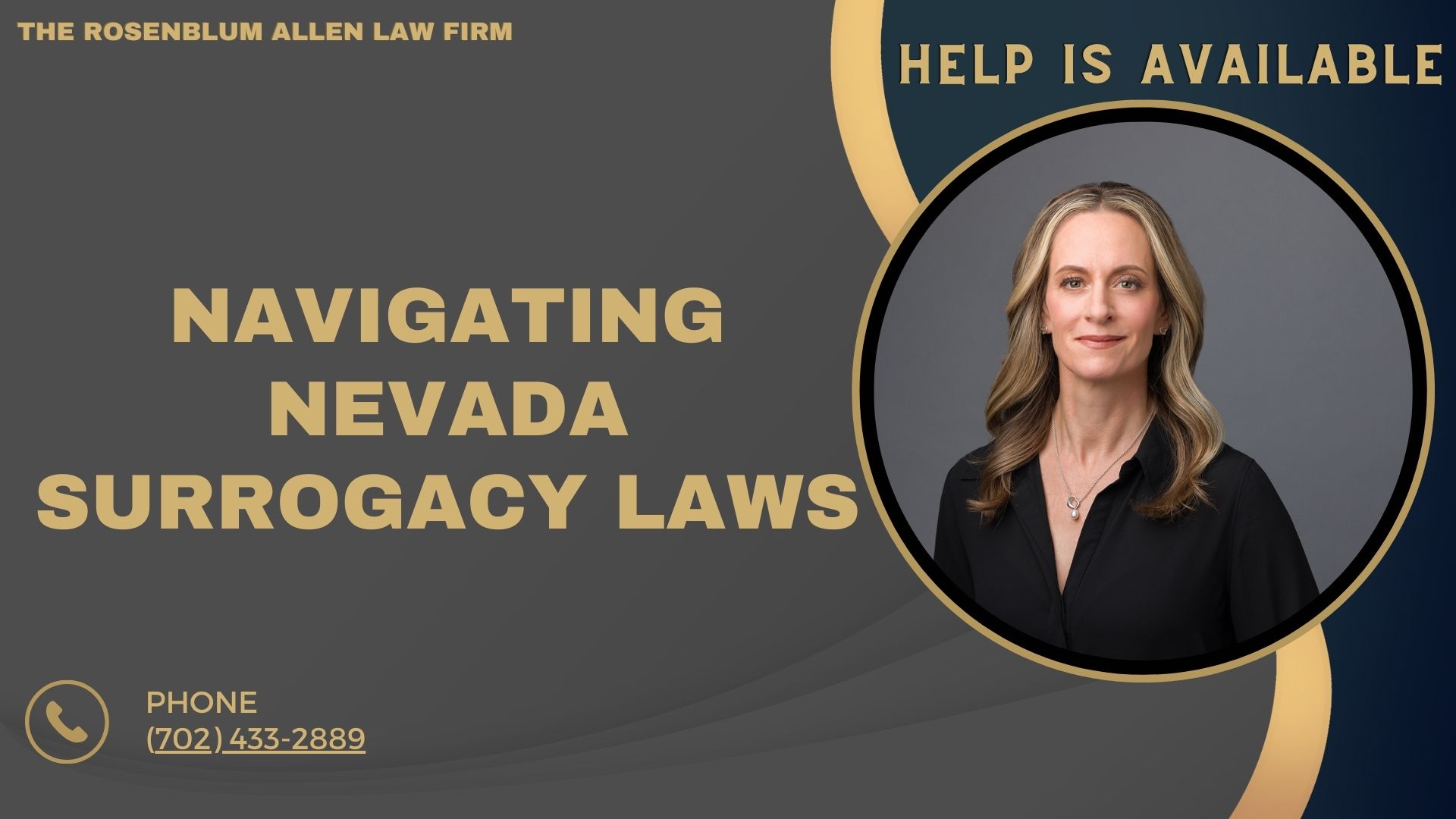Surrogacy is a method of assisted reproduction where an individual, referred to as the surrogate, agrees to carry and deliver a baby for another person or couple, known as the intended parents. This arrangement has gained significant traction in recent years, offering a solution for individuals and couples who face challenges in conceiving or carrying a pregnancy due to medical, personal, or other reasons.
Surrogacy provides hope to:
- Individuals with medical conditions preventing pregnancy.
- LGBTQ+ couples looking to grow their families.
- Single individuals wanting biological children.
The growing acceptance and availability of surrogacy arrangements, coupled with advancements in reproductive technologies, have made it an increasingly viable and popular option for building families.

 Why Nevada Is a Notable State for Surrogacy Arrangements
Why Nevada Is a Notable State for Surrogacy Arrangements
Nevada stands out as one of the most surrogacy-friendly states in the U.S. due to its progressive and comprehensive legal framework. Here’s why Nevada is an ideal location for surrogacy arrangements:
- Clear and favorable laws: Nevada allows both gestational and traditional surrogacy arrangements and legally recognizes contracts between intended parents and surrogates.
- Protection for all parties: The state has laws designed to protect the rights of surrogates and intended parents, minimizing legal complications.
- Inclusive eligibility: Nevada’s surrogacy laws apply to married couples, unmarried couples, and individuals regardless of gender or sexual orientation.
This supportive legal environment makes Nevada an attractive choice for surrogacy arrangements compared to other states with more restrictive or unclear regulations.
Surrogacy Laws in Nevada
Legal Definitions and Terminology
Understanding the terminology used in surrogacy law is essential. In Nevada, these key terms are important:
- Gestational Surrogacy: A process where the surrogate has no genetic link to the child, as the embryo is created using the intended parents’ or donors’ genetic material.
- Traditional Surrogacy: The surrogate uses her egg, making her biologically related to the child. This type is less common due to additional legal and emotional complexities.
- Intended Parents: The individuals or couples who will become the child’s legal parents.
Nevada law explicitly recognizes surrogacy contracts and provides a pathway for intended parents to establish legal parental rights, whether through pre-birth orders or post-birth proceedings.
Requirements for Intended Parents and Surrogates
Nevada has specific requirements that both intended parents and surrogates must meet to enter into a surrogacy agreement:
Intended Parents
- Must be adults (18 years or older).
- They can be married, unmarried, or single, regardless of sexual orientation.
- Must establish a written agreement with the surrogate, specifying their intentions and responsibilities.
Surrogates
- Must be at least 21 years old.
- They should have undergone a medical evaluation to confirm they are physically capable of carrying a pregnancy.
- Must have had at least one prior successful pregnancy and delivery.
- Required to pass psychological screening to ensure emotional readiness for the surrogacy journey.
These precise requirements provide a strong foundation for legally secure surrogacy arrangements in Nevada.

Types of Surrogacy
Traditional vs. Gestational Surrogacy
Surrogacy comes in two primary forms: traditional and gestational. Each type has unique characteristics and legal implications. Here’s a simple breakdown:
Type of SurrogacyWhat It InvolvesKey Difference
Traditional Surrogacy The surrogate provides her egg, making her the biological mother. Fertilization occurs via insemination. The surrogate has a genetic connection to the child, leading to more emotional and legal complexities.
Gestational Surrogacy The surrogate carries an embryo created from the intended parents’ or donors’ genetic material. The surrogate has no biological connection to the child, making this a more legally straightforward option.
Why Gestational Surrogacy is Preferred in Nevada
Nevada’s laws are more structured for gestational surrogacy. Because the surrogate has no biological connection to the child, establishing parental rights is more straightforward. This reduces the risk of disputes and helps both parties feel more secure.
Legal Implications for Each Type
- Traditional Surrogacy: Legal challenges may arise due to the surrogate’s genetic link. Some states require adoption proceedings for the intended parents. Nevada allows this type of surrogacy, but it’s far less common due to the potential complications.
- Gestational Surrogacy: Strong legal frameworks support this arrangement in Nevada, including pre-birth court orders that designate the intended parents as the child’s legal parents before birth.
When considering surrogacy, it’s crucial to understand these distinctions and consult a knowledgeable attorney to determine the best fit for your family’s needs.
Drafting a Surrogacy Contract
Essential Contract Components
A well-drafted surrogacy contract is the backbone of a successful arrangement. It ensures all parties understand their roles, rights, and responsibilities. Here’s what should always be included:
- Responsibilities of Each Party
- The surrogate agrees to carry the pregnancy and follow medical guidance.
- The intended parents commit to covering expenses and assuming parental responsibilities.
- Financial Arrangements
- Compensation for the surrogate (if applicable).
- Reimbursement for pregnancy-related medical and living expenses.
- Medical Decisions
- Agreement on how medical decisions will be handled during the pregnancy.
- Plans for managing unexpected medical complications.
- Termination Clause
- Terms under which the agreement can be ended (e.g. if the surrogate or intended parents change their minds).
- Parental Rights
- Confirmation that the intended parents will have full parental rights once the child is born.
- Waiver of parental claims by the surrogate (in the case of gestational surrogacy).
- Dispute Resolution
- A plan for resolving conflicts through mediation, arbitration, or legal proceedings.
Protecting Everyone’s Rights
The surrogacy contract protects both the surrogate and the intended parents. It ensures:
- The surrogate is fairly compensated and supported.
- The intended parents are recognized as the legal parents of the child.
A qualified attorney familiar with Nevada surrogacy law should always prepare this document. It’s the most crucial step in creating a secure and harmonious arrangement.

Establishing Parental Rights
Establishing parental rights is one of the most critical aspects of any surrogacy arrangement. It ensures that the intended parents are legally recognized as the child’s parents and that the surrogate has no parental responsibilities after birth. Nevada has a well-defined process to make this as smooth as possible.
Pre-Birth Court Orders
In Nevada, intended parents can obtain a pre-birth order (PBO). The court issues this legal document before the child is born and establishes the intended parents as the child’s legal parents.
Key Benefits of a Pre-Birth Order:
- The intended parents’ names will appear on the birth certificate immediately.
- It eliminates the need for adoption or additional legal proceedings after birth.
- It provides peace of mind to both the surrogate and the intended parents by clarifying parental roles early.
How to Obtain a Pre-Birth Order:
- Work with an attorney to draft and file the petition.
- Provide evidence of the surrogacy agreement and medical procedures (e.g., IVF records).
- Attend a short court hearing if required.
- Receive the court order, typically in the second or third trimester.
Post-Birth Procedures and Documentation
In some cases, additional steps may be needed after the child’s birth, though this is rare with a valid PBO. For example:
- If the intended parents are from another state or country, they may need additional documentation to confirm parental rights in their jurisdiction.
- In traditional surrogacy cases, adoption proceedings may be necessary to finalize parental rights.
In Nevada, the process is generally seamless for gestational surrogacy, making it an attractive option for families seeking legal clarity and security.
Ethical and Emotional Considerations
Surrogacy is not just a legal and medical process—it’s deeply personal. Everyone involved experiences a range of emotions, and ethical concerns can arise. Addressing these upfront helps create a positive experience for all parties.
Counseling and Support for All Parties
Surrogacy is a life-changing journey for the surrogate and the intended parents. Emotional preparation and support are essential.
Recommended Steps:
- Surrogate counseling: Helps surrogates manage the emotional aspects of carrying a child for someone else.
- Intended parent counseling: Provides tools to navigate the emotional challenges of surrogacy, such as balancing excitement with the uncertainty of the process.
- Joint sessions: Encourages open communication and mutual understanding between the surrogate and intended parents.
Many agencies and legal professionals require counseling before the process begins. This helps everyone feel confident and supported.
Navigating Potential Conflicts or Changes
Even with a clear contract, unforeseen issues can arise. Examples include:
- Changes in the surrogate’s or intended parents’ life circumstances.
- Emotional disagreements over pregnancy-related decisions.
How to Address These Issues:
- Include a clear dispute resolution plan in the surrogacy contract.
- Maintain open communication and foster mutual respect throughout the process.
- Engage a mediator or counselor to help resolve conflicts constructively.
While challenges can occur, intense preparation and professional guidance minimize the risk of disputes and ensure a smoother journey.

Breaking It All Down
Surrogacy is a complex process that involves legal, medical, and emotional aspects. It is crucial to have the right team to guide you.
Legal guidance ensures that every part of the process complies with Nevada’s surrogacy laws. This includes creating a firm contract, securing parental rights, and navigating potential disputes. Medical guidance ensures the health and safety of both the surrogate and the child, from the IVF process to delivery.
When all aspects are carefully managed, surrogacy becomes a secure and fulfilling path to building a family.
A well-structured surrogacy arrangement provides peace of mind to everyone involved.
- For intended parents: It guarantees their parental rights are protected and their child will be cared for throughout the pregnancy.
- For surrogates: It ensures they are fairly compensated, supported, and cared for emotionally and physically.
- For the child: It provides a clear legal and emotional foundation, fostering stability from day one.
In Nevada, where laws are clear and supportive, surrogacy arrangements can be a life-changing experience built on trust, communication, and mutual respect.

Frequently Asked Questions
What is surrogacy?
Surrogacy is an arrangement where a woman (the surrogate) agrees to carry and deliver a baby for another person or couple (the intended parents). The process can involve the surrogate being biologically related to the child (traditional surrogacy) or not (gestational surrogacy).
Is surrogacy legal in Nevada?
Yes, surrogacy is entirely legal in Nevada. The state has clear and supportive laws that protect both intended parents and surrogates, making it one of the most surrogacy-friendly states in the U.S.
What's the difference between gestational and traditional surrogacy?
- Gestational Surrogacy: The surrogate has no biological link to the baby, as the embryo is created using the intended parents’ or donors’ genetic material.
Traditional Surrogacy: The surrogate uses her egg, making her the biological mother of the child. This type is less common due to additional legal and emotional complexities.
Who can become an intended parent in Nevada?
Nevada’s surrogacy laws are inclusive. Intended parents can be:
- Married or unmarried couples.
- Same-sex couples.
- Single individuals.
Who can be a surrogate in Nevada?
Surrogates in Nevada must meet specific requirements, including:
- Being at least 21 years old.
- Having had at least one successful pregnancy and delivery.
- Passing medical and psychological evaluations to ensure readiness.
What costs are involved in a surrogacy arrangement?
Surrogacy costs typically include:
- Surrogate compensation: Payment for the surrogate’s time and effort.
- Medical expenses: IVF procedures, prenatal care, and delivery.
- Legal fees: Drafting and reviewing contracts, securing parental rights.
Other expenses: Counseling services, travel, or maternity-related needs for the surrogate.
How are parental rights established in Nevada?
Nevada allows intended parents to obtain a pre-birth order (PBO). This court order establishes the intended parents as the legal parents before the child is born. Their names will appear on the birth certificate immediately after delivery.
Can a surrogate change her mind during the process?
Nevada’s legal framework minimizes this risk, particularly for gestational surrogacy. A well-drafted contract ensures that the surrogate waives parental claims and recognizes the intended parents’ legal rights.
Do I need a lawyer for surrogacy in Nevada?
Yes. Surrogacy involves complex legal agreements and court procedures. A qualified surrogacy attorney ensures the process complies with Nevada law, protects your rights, and avoids potential disputes.
How long does the surrogacy process take?
The surrogacy journey typically takes 12–18 months from start to finish. This includes finding a surrogate, completing medical procedures, and carrying the pregnancy to term.
Can international intended parents pursue surrogacy in Nevada?
Yes, Nevada welcomes international intended parents. The state’s legal system and accessible pre-birth orders make it an ideal choice for individuals and couples worldwide.
What support is available for surrogates and intended parents?
Nevada has robust resources, including:
- Support groups for surrogates and intended parents.
- Counseling services to help navigate the emotional aspects.
- Experienced agencies and legal professionals will guide the process.

Additional Resources for You from The Rosenblum Allen Law Firm.
At The Rosenblum Allen Law Firm, we provide comprehensive legal services beyond surrogacy. Below are some additional resources that may be helpful, with embedded links for your convenience:
Criminal Defense Attorney: If you are facing criminal charges, our experienced defense team is here to protect your rights and fight for the best possible outcome.
Las Vegas DUI Lawyer: We help individuals accused of DUI offenses navigate the legal process, minimize penalties, and protect their driving privileges.
Domestic Violence Lawyer Las Vegas: If you are dealing with allegations of domestic violence, we offer compassionate representation to help you through these challenging situations.
Drug Possession Lawyer: Whether you’re facing misdemeanor or felony drug charges, we provide aggressive legal defense to safeguard your future.
Sex Crimes Attorney: Our firm offers discreet, skilled representation for those accused of sensitive sex crime cases, ensuring that your rights are protected.
CPS Defense Attorney: If you are facing allegations of child abuse or neglect, we are here to protect your parental rights and guide you through the CPS process.
Misdemeanor Lawyer: For minor offenses, our team helps clients resolve their cases efficiently and minimize long-term consequences.
Las Vegas Warrant Defense Attorney: If you have an active warrant, we can help you address it before it escalates to an arrest.
Las Vegas Probation Violation Attorney: If you’ve been accused of violating probation, we’ll work to defend you and reduce potential penalties.
Theft Crime Defense Lawyer: Whether you’re facing shoplifting or more serious theft charges, our firm is prepared to defend your case.
Kidnapping Lawyers: If you’re dealing with kidnapping charges, we’ll provide strategic legal support tailored to your situation.
Juvenile Defense Lawyers: Our firm is dedicated to protecting the rights of juveniles and helping them navigate the justice system.
Firearms Lawyer Las Vegas: We assist clients accused of firearm-related offenses, ensuring their rights are preserved and their cases are handled effectively.
Let us know how we can help. At The Rosenblum Allen Law Firm, your case is our priority. Feel free to reach out to us for assistance or consultation!

Offsite Resources for You
Here are some helpful offsite resources related to surrogacy and family law that you might find useful:
American Society for Reproductive Medicine (ASRM) – ASRM provides information and resources on fertility treatments, surrogacy, and reproductive health.
Resolve: The National Infertility Association – This nonprofit organization offers support for people dealing with infertility and the surrogacy process.
Surrogate Mothers Online – A helpful online community for surrogates, intended parents, and those exploring surrogacy options.
American Bar Association – Family Law Section – A resource for family law professionals that includes articles, guidelines, and legal information regarding surrogacy and other family-related legal matters.
Circle Surrogacy – A well-established agency providing surrogacy services, resources, and support for intended parents and surrogates.
The National Surrogacy Center – Provides resources for those considering surrogacy, including educational materials and professional services.
FertilityIQ – A platform offering reviews, ratings, and education on fertility treatments, including surrogacy, to help intended parents make informed decisions.
These sites offer valuable information, whether you’re just starting your surrogacy journey or looking for additional support. Feel free to explore them for more insights!

A Special Message from Our Lead Attorney, Molly Rosenblum Allen, Esq

Thank you so much for taking the time to explore these resources. We understand how important and personal this journey is, and we’re here to help guide you every step of the way. If you’re ready to take the next step or have any questions, please don’t hesitate to contact me and my team. Call us at (702) 433-2889, and we’ll get the ball rolling on your situation.
We look forward to assisting you!
Warm regards,
Molly
The Rosenblum Allen Law Firm




